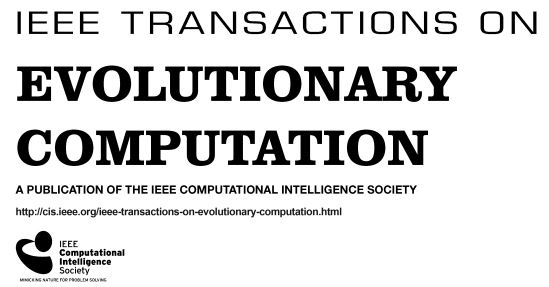MOTEA-II: A Collaborative Multiobjective Transformation-Based Evolutionary Algorithm for Bilevel Optimization
IF 11.7
1区 计算机科学
Q1 COMPUTER SCIENCE, ARTIFICIAL INTELLIGENCE
引用次数: 0
Abstract
Evolutionary algorithms (EAs) for optimization have received wide attention due to their robustness and practicality. However, the traditional way of asynchronously handling bilevel optimization problems (BLOPs) ignores the benefits brought by effective upper- and lower-level collaboration. To address this issue, this article proposes a collaborative multiobjective transformation (MOT)-based EA (MOTEA-II). In MOTEA-II, the BLOP is handled within a decomposition-based multiobjective optimization paradigm using a two-stage collaborative MOT strategy. The stage-1 MOT focuses on multiple lower-level optimizations and collaboration, while stage-2 collaborates the upper-level optimization with lower-level optimization, which makes simultaneously horizontal and vertical optimization information sharing in bilevel optimization possible. In addition, a dynamic decomposition strategy is further proposed to reconstruct the hierarchy relationship in collaborative multiobjective optimization, facilitating the adaptive and flexible importance control of the upper-level objective optimization and lower-level optimality satisfaction for better-bilevel search efficiency. Empirical studies are conducted on two groups of commonly used BLOP benchmark suites and four practical applications. Experimental results show that the proposed collaborative MOTEA-II can achieve performance comparable to that of the previous MOTEA and three other representative EA-based bilevel optimization approaches, but using much fewer computational resources.MOTEA-II:一种基于协同多目标变换的双层次优化进化算法
进化算法以其鲁棒性和实用性受到了广泛的关注。然而,传统的异步处理双层优化问题的方法忽略了有效的上下级协作所带来的好处。为了解决这个问题,本文提出了一个基于协作多目标转换(MOT)的EA (MOTEA-II)。在MOTEA-II中,使用两阶段协作MOT策略在基于分解的多目标优化范式中处理BLOP。第一阶段MOT侧重于多个底层优化和协同,第二阶段MOT侧重于上层优化和下层优化的协同,使得两级优化同时实现横向和纵向的优化信息共享成为可能。此外,本文还提出了一种动态分解策略来重构协同多目标优化中的层次关系,实现了对上层目标优化和下层最优性满意度的自适应、灵活的重要性控制,以获得更好的二层搜索效率。对两组常用的BLOP基准套件和四个实际应用进行了实证研究。实验结果表明,所提出的协同MOTEA- ii可以达到与之前的MOTEA和其他三种具有代表性的基于ea的双层优化方法相当的性能,但使用的计算资源要少得多。
本文章由计算机程序翻译,如有差异,请以英文原文为准。
求助全文
约1分钟内获得全文
求助全文
来源期刊

IEEE Transactions on Evolutionary Computation
工程技术-计算机:理论方法
CiteScore
21.90
自引率
9.80%
发文量
196
审稿时长
3.6 months
期刊介绍:
The IEEE Transactions on Evolutionary Computation is published by the IEEE Computational Intelligence Society on behalf of 13 societies: Circuits and Systems; Computer; Control Systems; Engineering in Medicine and Biology; Industrial Electronics; Industry Applications; Lasers and Electro-Optics; Oceanic Engineering; Power Engineering; Robotics and Automation; Signal Processing; Social Implications of Technology; and Systems, Man, and Cybernetics. The journal publishes original papers in evolutionary computation and related areas such as nature-inspired algorithms, population-based methods, optimization, and hybrid systems. It welcomes both purely theoretical papers and application papers that provide general insights into these areas of computation.
 求助内容:
求助内容: 应助结果提醒方式:
应助结果提醒方式:


